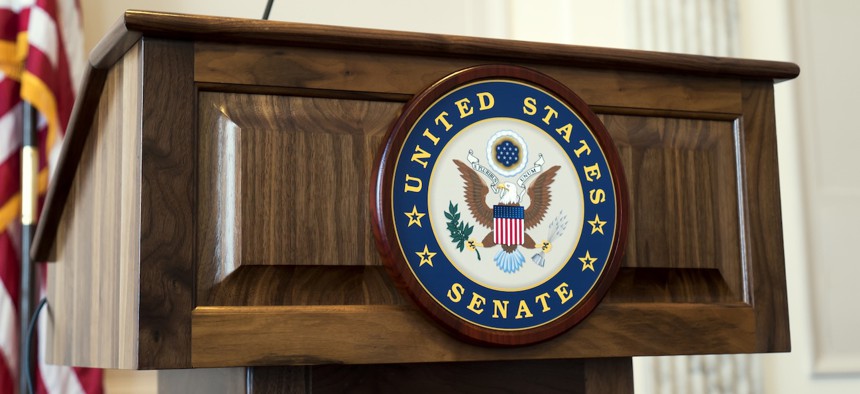
The Senate parliamentarian last week ruled that most of the proposals violated the Byrd rule. mphillips007/Getty Images
All provisions targeting federal worker benefits, unions stricken from Senate reconciliation package
The Senate parliamentarian previously ruled that most of the proposals aimed at cutting federal employees’ retirement benefits and civil service protections violated a rule to ensure reconciliation bills are budgetary in nature.
The Senate voted late Saturday to open debate on Republicans’ budget reconciliation package, which aims to cut federal spending in order to partially pay for extended tax cuts for the wealthy and increased immigration enforcement, though the measure’s burden on federal employees is now lighter.
That’s because, according to bill text released by the Senate Budget Committee Saturday, the legislation no longer targets federal workers’ retirement benefits, civil service protections or their labor unions.
When the House passed its version of the so-called “One Big Beautiful Bill” in May, it included a barrage of policies that made federal employees contribute more of their paychecks toward their Federal Employees Retirement System pension, while reducing the ultimate value of those benefits.
Those plans included eliminating the FERS supplement for many federal workers who retire before Social Security kicks in at 62 and requiring all new federal workers to elect between serving as at-will employees with no civil service protections or paying an additional 5 percentage points—9.4%—of their basic pay toward FERS. A proposal to base federal employees’ FERS annuity payments on the average highest five years of their salary, rather than the current High-3 formula, was removed just before the measure’s passage.
On the Senate side, Homeland Security and Governmental Affairs Committee Republicans, led by Chairman Rand Paul, R-Ky., removed the provision that would have eliminated the FERS supplement, but expanded the provision increasing future federal employees’ retirement contributions. According to the panel’s draft, new employees would pay 9.4% toward FERS if they served on an at-will basis, and nearly 15% if they wished to accrue civil service protections.
In both the House bill and Senate committee draft was a provision to require federal workers to pay a $350 filing fee in order to appeal an adverse personnel action to the Merit Systems Protection Board.
The initial Senate version also included language that would have given President Trump broad latitude to reorganize federal agencies as he saw fit, along with $100 million in additional funding for the Office of Management and Budget to support that effort.
Another proposal would have charged a 10% processing fee for elective payroll deductions, which would have targeted charities that participate in the Combined Federal Campaign as well as federal employee unions. And it would have required agencies to charge labor groups for their use of agency property and officials’ use of official time.
But the Senate parliamentarian last week ruled that most of these proposals violated the Byrd rule, which aims to limit reconciliation legislation—and its simple majority threshold for passage—to topics that are budgetary in nature.
Though Politico reported that Senate Republicans explored amending its retirement proposal to require new employees to pay 15.6% of their paychecks toward FERS, with no at-will employment election, it was not included in the bill as it was prepared for debate on the floor.
All that remains in Saturday’s draft of the bill are instructions and funding for the Office of Personnel Management to conduct an audit of the Federal Employees Health Benefits Program for ineligible dependent beneficiaries and $100 million in funding for OMB to find “budget and accounting efficiencies.”
Share your news tips with us:
Erich Wagner: ewagner@govexec.com; Signal: ewagner.47
NEXT STORY: Retired and confused about Medicare Part B? You’re not alone







